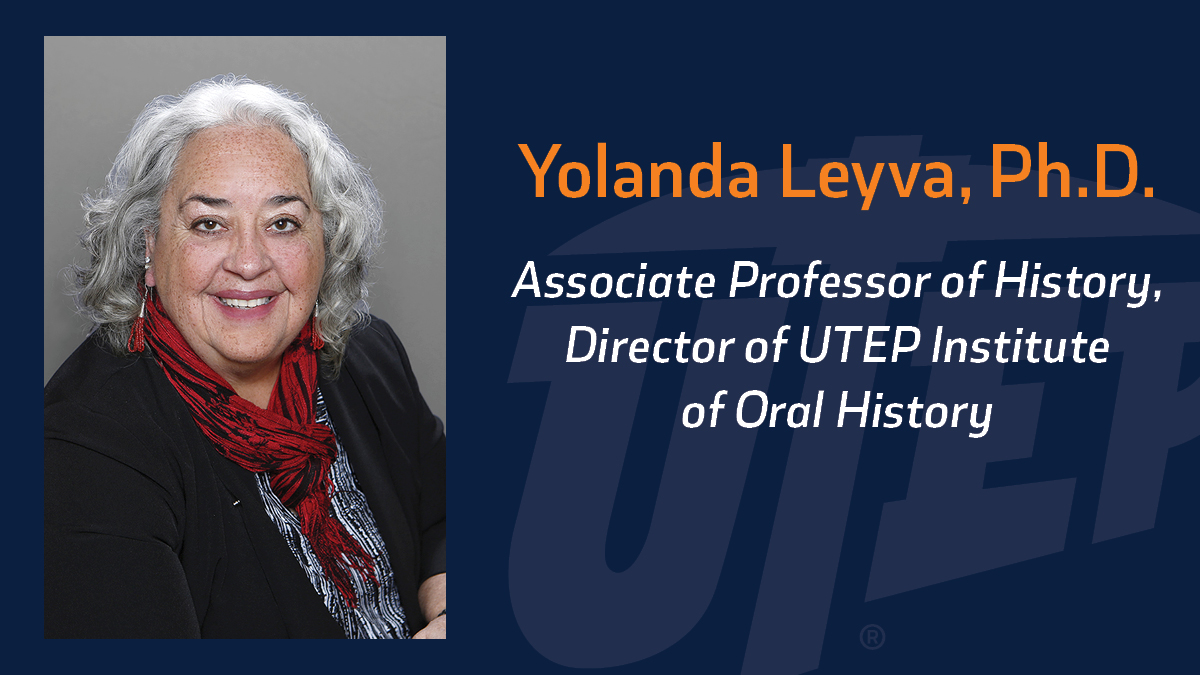
Texas Group Honors UTEP’s Oral History Program
Last Updated on May 12, 2021 at 3:00 PM
Originally published May 12, 2021
By Daniel Perez
UTEP Communications
The Texas Digital Library (TDL) recently announced that The University of Texas at El Paso’s Institute of Oral History (IOH) was its 2021 Outreach Award recipient for its creative and successful approach to increased awareness and accessibility to digital information.

The TDL will present the award virtually May 25, 2021, during the group’s Texas Conference on Digital Libraries.
Yolanda Leyva, Ph.D., IOH director and associate professor of history, said she was thrilled that the TDL recognized the Institute of Oral History.
“For several years now, we have sought ways to make our oral history collection accessible to the greater community,” Leyva said. “Through the talents of the IOH team, which includes undergrads, graduate students, affiliated faculty and staff, we’ve worked hard to produce engaging videos based on oral histories in our collection.”
Lauren Goodley, chair of the TDL’s 2021 awards committee and an archivist with the Wittliff Collections at Texas State University in San Marcos, told Leyva in the group’s announcement letter that there were many nominations, but that UTEP most deserved the recognition.
The IOH, the country’s largest repository of border-related oral histories, was nominated in part for three popular video projects, “Voices from the Border,” and “La Frontera Speaks,” produced by Leyva and “El Paso Food Voices,” produced by Meredith E. Abarca, Ph.D., professor of English and an IOH-affiliated faculty. Each series uses oral histories as key components.
Ligia A. Arguilez, a doctoral student in borderlands history and an IOH graduate research assistant, said the Outreach Award is significant because it recognizes the institute’s goals of public accessibility and engagement to the collection.
Arguilez, a native of Tijuana, Mexico, who was raised in El Paso, works on special projects and writes and creates historical context for “La Frontera Speaks,” the institute’s public outreach video series.
“The idea is not only to preserve people’s histories, their voices, but to work to highlight them as part of our shared history here on the frontera,” said Arguilez, a first-generation college student and UTEP alumna who earned her bachelor’s and master’s degrees in history in 2016 and 2018, respectively.
For decades, the IOH has worked with UTEP’s C.L. Sonnichsen Special Collections Department in the University Library to make the program’s oral histories accessible through the library. In 2020, students and scholars used the University’s searchable database to download 22,232 oral histories from the IOH collection that dates back to the 1960s. The subject matter includes West Texas, immigration, border history, entrepreneurship, Mexican Americans, and daily life on the border, as well as significant historical events such as the Bracero program, where approximately 4.6 million Mexican nationals were allowed to come to the United States temporarily as laborers from 1942 through 1964.
While the IOH specializes in historical topics, it also records people involved in current events that will have historical significance. One example was when young asylum seekers from Central America were detained at federal camps close to El Paso. Another involved recordings of residents and former residents of Duranguito, what some consider El Paso’s first neighborhood. The City of El Paso plans to build an entertainment arena on the site.
The IOH is a joint effort led by Leyva, other faculty members, graduate and undergraduate students and University staff. Among its sponsors is the Humanities Collaborative at EPCC-UTEP, which involves the El Paso Community College and is funded through the Andrew W. Mellon Foundation.
The TDL is a cooperative consortium rooted in higher education. Its goal is to preserve digital content and ensure equitable access to it for research, instruction, cultural heritage and institutional memory.
